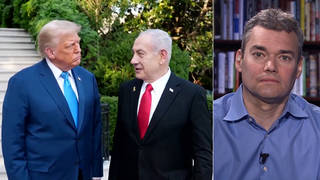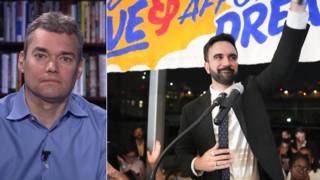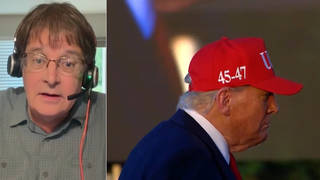
Topics
The daily carnage in Iraq continued across Iraq yesterday. Eight Iraqis and one U.S. soldier were killed in clashes in Fallujah, two U.S. soldiers and one Iraqi were killed in Baghdad and 43 Iraqis were killed in Najaf. We go to Najaf to get a report from a peace activist acting as a human shield and we speak with author Rahul Mahajan about Fallujah. [includes rush transcript]
The daily carnage in Iraq continued yesterday with renewed fighting in cities and towns across the country. Eight Iraqis and one U.S. soldier were killed in clashes in Fallujah. The marines called in air strikes, destroying a minaret that Iraqi guerillas had reportedly been firing from. U.S. forces say they are going to begin patrolling the hostile town with Iraqi forces but have delayed doing so until Thursday.
Renewed fighting also erupted around Najaf and Kufa, with the US determined to move into some new positions in Najaf. Militiamen loyal to radical Shiite cleric Moqtada al-Sadr attacked U.S. forces who were replacing Spanish troops at a fort on the outskirts of town. U.S. gunships responded, killing 43 Iraqis.
Chief US administrator in Iraq, Paul Bremer, has ordered Sadr to withdraw his militia and its weapons from mosques and schools in Najaf. Sadr has threatened to unleash suicide bombers against American forces if they enter the holy city. In an interview with the Italian paper “La Repubblica” Monday, Sadr predicted that if the US arrests or kills him, the Iraqi people will unleash on them the fires of hell.
Meanwhile, two U.S. troops were killed and five wounded in Baghdad when a house blew up as they were trying to inspect it for chemical weapons. After the blast, Baghdad residents celebrated on top of burnt Humvees.
The Washington Post reports an alarming increase in the number of U.S. soldiers wounded this month. Doctors say they are performing one craniotomy per day, where they remove the skull to get at injured brain tissue. One surgeon told the Post: “We’ve done more in eight weeks than the previous neurosurgery team did in eight months”.
Finally, Iraq’s U.S.-selected leaders approved a new flag for the country, dumping Saddam Hussein’s red-and-black standard. The new design is white with two blue stripes, and although it has a crescent representing Islam, the flag no longer bears the words “God is great.”
The new design not only abandons the symbols of Saddam’s regime. It also avoids the colors used in other Arab flags: green and black for Islam and red for Arab nationalism. The Associated Press notes that the only country in the Middle East with blue stripes in its flag is Israel, which has a Star of David on a field of white between horizontal blue bands.
- Peter Lumsbaine, head of The Najaf Emergency Peace Team, a handful of peace activists who have arrived in Najaf. They plan to act as human shields if US troops goes into the holy city to crush Shiite cleric Muqtada al-Sadr.
- Rahul Mahajan, is an independent journalist and author. He has just come out of Iraq, where he spent nearly a month reporting from the ground. He was one of the only unembedded journalists to make it into Fallujah. He runs a blog called empirenotes.org.
Transcript
AMY GOODMAN: We turn now to Peter Lumsbaine. He is with the Najaf Emergency Peace Team, a handful of peace activists who have arrived in Najaf. They plan to act as human shields if the U.S. troops go into the holy city. We welcome you to Democracy Now!, Peter Lumsbaine.
PETER LUMSBAINE: Thank you, Amy.
AMY GOODMAN: Can you tell us just where you are?
PETER LUMSBAINE: Yes. I am in the downtown area, not the center, but the downtown area of Najaf, Iraq, with the Najaf Emergency Peace Team, as you said. We have been here for a few days. Before that, we were in Karbala, which is also in a fairly tense situation as well. And we have met with representatives of Ayatollah Ali Sistani office and representatives of Moqtada al-Sadr’s organization. We are not using the term human shield, but we are here as a witness and protective accompaniment present to stand with the people of Najaf and appeal to the American troops to not attack the city, which we believe would be a complete disaster for everybody involved. So, we are here on the ground in Najaf, Iraq, right now.
AMY GOODMAN: What are representatives of Moqtada al-Sadr saying right now?
PETER LUMSBAINE: Well, I have to say that every Iraqi that we have met with, and we were warned many times, to not come to Iraq. We arrived in Amman, Jordan, when many NGOs and people from different organizations were on their way out of Iraq and had come to Amman. Many people warned us not to come in. This would be dangerous. We know there are dangers. We recognize that. We have to say that every Iraqi we have met and talked to has been cordial and welcoming to us. We have encountered absolutely no hostility. The representatives of Ayatollah Ali Sistani and Moqtada al-Sadr have been gracious and courteous to us in our discussions. They said they want peace, not war, they want a negotiated settlement, and that they want democracy and elections and — for Iraqis to determine their own future. This is what they told us. But as you say, they have also warned if the Americans push for a confrontation, that they will be unleashing very powerful forces of armed resistance here in Iraq if they do that. So, I think they have pushed for the idea of the U.S. drawing back from the cities, from confrontation and allowing the Iraqi people to proceed with elections and determining their own future. But they are also very ready, I think, to fight if that’s what it comes down to. In Kufa or near there last night there was a major confrontation, as you reported.
AMY GOODMAN: Is there a difference between the approaches of Sistani and Moqtada al-Sadr?
PETER LUMSBAINE: Yes, there is. We are not really here to engage in a debate on one side or the other, but we are listening carefully to what many Iraqis are saying, people in Karbala and people in Najaf and also people with these organizations here in Najaf as well. Yes, I think there is a difference. I think there’s common ground in terms of the demands for prompt elections, this year, this summer, before the U.S. Presidential elections. I think this is not sometimes publicly stated, but I think this is a key point. Many, many Iraqis, including people in Sistani’s and al-Sadr’s organizations want prompt national elections, I would say, clearly before the U.S. Presidential elections, and also they do not want American troops going into Najaf. They want American troops to stand down from the kind of confrontational actions they have taken around the country during the past month. But there are differences, too, and certainly, Ali Sistani, the Ayatollah here, has been a voice of caution and calm and moderation; and al-Sadr’s people have taken a somewhat more tough or radical line towards the Americans. But, I think there are differences, definitely, but I think there’s also common ground.
AMY GOODMAN: Peter Lumsbaine, can you tell us who you are, and the group of you who are there? Where are you from?
PETER LUMSBAINE: Absolutely. Right. Let me just say there are five people here on this delegation. Myself, and also Reverend Meg Lumsbaine and Mario Galvan, Trish Shu and Brian Buckley. We are from California, New York and Virginia, and we’re representing our home communities and also a number of organizations in the United States. For instance, Mario is one of the National Board Members of Peace Action and a founding member of the Zapatista Solidarity Coalition. Trish Shu has worked with military families and piece organizations in the past, since Desert Storm. I coordinate the Military Globalization Project, an Analysis and Resistance Organizing project in California. Meg is actually an ordained Lutheran pastor. We come from a variety of peace and human rights organizations.
AMY GOODMAN: From the Catholic Worker Community as well.
PETER LUMSBAINE: The Catholic Worker Community as well. Brian is from the Catholic Worker Community in Virginia. So yes, we come from those backgrounds. And we are in close touch with people in grassroots organizations at a local, state-wide and national level in the United States. And we see ourselves as informal but real representatives of the people in the United States who are very concerned, increasing numbers of people in the United States who are concerned about where the situation is going in Iraq, and organizations which are opposed to the U.S. military occupation here. I think many, many Iraqis have told us —- Iraqi men and women in Karbala and Najaf and other places—- Meg and I were also here in October and we heard the same message— that the Iraqis were glad that Saddam was booted out, but that now that has turned into an open ended and increasingly aggressive American military occupation, which is more and more starting to resemble the very regime that they claimed to replace. Also I think Iraqis have emphasized again and again how Saddam himself was supported for years and years during his worst phases of repression by the U.S. government. People, although they are glad that Saddam was kicked out, they are skeptical of U.S. intentions and very opposed to the increasingly harsh occupation here.
AMY GOODMAN: Are you afraid for your own lives?
PETER LUMSBAINE: Well, I think there is an element of fear. The danger here is undeniable. I think like I say, the Iraqi people that we have talked to have been welcoming, and also we have been getting messages of support from all over the world, Europe, Asia, Latin America and so forth. There is an element of danger here, particularly if the U.S. forces, military forces push forward towards Najaf. Then it could turn into an extremely dangerous situation. So yes, we have been somewhat concerned. We know there are risks, but we feel that unless people who are working for peace and justice and peacemaking are willing to — people who are called to peacemaking are willing to shoulder at least some of the risks that soilders very often take for the sake of war, that we cannot reverse that dynamic. We know there are dangers, but we are willing to deal with that. We are calling on people throughout the United States and the world to also join in these kinds of delegations at this time. This is a time when we must not abolish the presence of NGO’s and peace and justice groups in Iraq. Here there are dangers but people need to come here as witnesses and protect every accompaniment, to stand with the Iraqi people even if there are dangers. We feel that strongly and put out that call. There are actually a couple of contact numbers, e-mails that people can get in touch with us if they are interested in joining a second or third wave of the work we’re trying to do here.
AMY GOODMAN: One of the email addresses?
PETER LUMSBAINE: One of those e-mail addresses. What I would suggest is either Mario Galvan. That’s mariogalvan 44@hotmail.com.
AMY GOODMAN: And people can go to our website at democracynow.org and we will have the contact information. Peter Lumsbaine, I want to thank you for being with us. The Najaf Emergency Peace Team is in Najaf right now. We thank you and be safe. This is Democracy Now!. When we come back, we will talk to a reporter just out of Fallujah. We’ll talk about the latest report on what Americans understand about weapons of mass destruction. We’re going to be speaking with journalist Mario Murrillo about Colombia and the United States, War and Unrest and Destabilization and activist Ray Rogers, why he was dragged out of a Coca-Cola’s shareholders meeting.
AMY GOODMAN: This is Democracy Now!, the War and Peace report. I’m Amy Goodman. Also at democracynow.org. We were talking about Najaf. Now to Fallujah. Rahul Mahajan has just come out of Fallujah, one of the few westerners who has been there. The situation: eight Iraqi, one U.S. Soldier killed in clashes in Fallujah. The marines called in air strikes destroying a minaret, which they said insurgents had reportedly been firing from. Can you talk about the situation in Fallujah?
RAHUL MAHAJAN: Well, obviously it’s very tense. All of the signs point to a renewed offensive. The US assaulted the city with pretty much everything but the kitchen sink: 2,000 bombs from f-16’s, ac-130’s, specter gun ships, super cobra helicopter tanks. They were not able to take it in the first offensive. So they decided to try to win a military victory by negotiation instead, by getting the rebels essentially to disarm after which, presumably, the united states would go into the city and round them all up and put — throw them into the prison and throw away the key as they have done with so many thousands of other Iraqis. Obviously, that wasn’t going to work. The rebels were not going to disarm. It’s just a matter of time. They’re trying to get that military victory by negotiation. They’re talking about joint patrols with Iraqi security forces which essentially means using Iraqi security forces as human shields. It’s a common practice when they do have joint patrols. But that’s just a way of seeing whether they can force a capitulation or provoke another escalation and go in and finish off the job. It’s likely to be extremely bloody, if they do.
AMY GOODMAN: Just out of Fallujah, author of “Full Spectrum Dominance,” and running the website empirenotes.org, Rahul Mahajan, I want to thank you for being with us.













Media Options